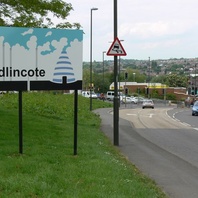
Viking Names
Swadlincote
Swadlincote, in the Repton and Gresley Hundred of Derbyshire, probably comes from the Old Norse male personal name Svartlingr and the Old English element cot ‘cottage, hut, shelter, den’. However, it is possible that the first element may equally well represent the Old English male personal name Sweartling.
Read More
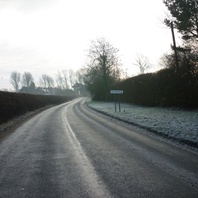
Viking Names
Stixwould
Stixwould, in the South Riding of Lincolnshire, is a hybrid place-name from the Old Norse male personal name Stigr and Anglian wald ‘a forest; high forest-land’, which is topographically appropriate.
Read More
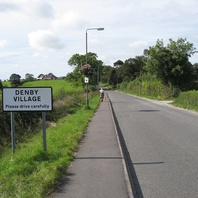
Viking Names
Denby
Denby, in the Morleyston and Litchurch Hundred of Derbyshire, takes its name from the Old English ethnonym Dene ‘a Dane’ and Old Norse by ‘a farmstead, a village’. Traditionally, the place-name has been interpreted as referring to a settlement of Danes. However, the exact implications of such a name are not yet fully understood and are the subject of ongoing work by Dr Jayne Carroll of the Institute for Name-Studies, University of Nottingham.
Read More
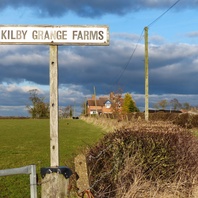
Viking Names
Kilby
Kilby, in the Guthlaxton Hundred of Leicestershire, was probably an Old English compound from Old English cild (cilda genitive plural) ‘a child, a young person, a boy, a son (usually implying noble birth)’ and Old English tun ‘an enclosure; a farmstead; a village; an estate’. The place-name underwent Scandinavianization with the generic tun being replaced with Old Norse by ‘a farmstead, a village’ and the use of an initial Old Norse k for the Old English initial ch.
Read More
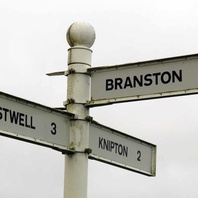
Viking Names
Knipton
Knipton, in the Framland Hundred of Leicestershire, is a Anglo-Scandinavian hybrid from Old Norse gnípa ‘a steep rock or peak’ and Old English tun ‘an enclosure; a farmstead; a village; an estate’. The name is topographically appropriate as the village lies in a narrow valley with hills rising steeply on each side. Pagan Anglian burials here suggest an earlier Old English place-name that was replaced with Scandinavian settlement.
Read More
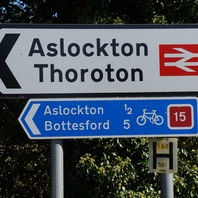
Viking Names
Thoroton
Thoroton, in the Bingham Wapentake of Nottinghamshire, comes from the Old Norse male personal name Þurferð and the Old English element tun ‘farm, settlement’. It is thus a hybrid name, like others nearby, such as Aslockton and Colston Bassett. The Thoroton Society, Nottinghamshire’s principal historical and archaeological society, takes its name from Dr Robert Thoroton who, in 1677, published the first history of the county. He in turn (or rather one of his ancestors) presumably took his name from the village.
Read More
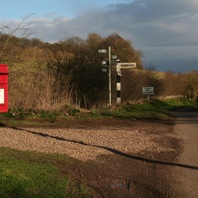
Viking Names
Skendleby
Skendleby, in the South Riding of Lindsey of Lincolnshire, is a name of uncertain origin. The first element is obscure, but is perhaps scenehelde ‘beautiful slope’ from Old English scene ‘bright, beautiful’ and helde ‘slope’. The second element of the place-name is Old Norse by ‘a farmstead, a village’.
Read More

Viking Names
Sookholme
Sookholme, in the Bassetlaw Wapentake of Nottinghamshire, lies in a river valley and the etymology of the name reflects its location. The first element is Old English sulh ‘a plough; a ploughland (i.e. the amount of land which can be cultivated with one plough)’ which is combined with the second element, Old Norse holmr ‘an island, an inland promontory, raised ground in marsh, a river-meadow’. Thus it is a hybrid name with the probable meaning of ‘gully island’.
Read More
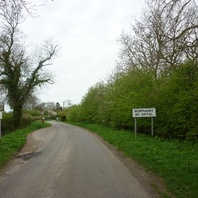
Viking Names
Normanby by Spital
Normanby by Spital, in the Aslacoe Wapentake of Lincolnshire, takes its name from the Old English ethnonym Norðman ‘Northman, Norwegian’ and the Old Norse element bý ‘a farmstead, a village’. A Domesday form of the name, Normanestouu, has as the second element Old English stow ‘a place, a place of assembly’, but this form is not supported by later recordings. The suffix Spital is for its proximity to Spittal in the Street, ‘hospital on a Roman road (Ermine Street)’. Traditionally, the place-name has been interpreted as referring to a settlement of Norwegians (in an area where most of the Scandinavian settlers were Danes). However, the exact implications of such a name are not yet fully understood and are the subject of ongoing work by Dr Jayne Carroll of the Institute for Name-Studies, University of Nottingham. There are other Normanbys in Lincolnshire, Normanby in Burton upon Stather and Normanby by Stow.
Read More
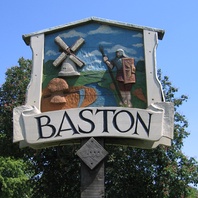
Viking Names
Baston
Baston, in the Ness Wapentake of Lincolnshire, is an Anglo-Scandinavian hybrid compound from the Old Norse male byname Bak meaning ‘back’ and the Old English element tun ‘an enclosure; a farmstead; a village; an estate’.
Read More
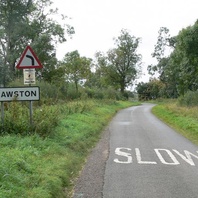
Viking Names
Slawston
Slawston, in the Gartree Hundred of Leicestershire, is an Anglo-Scandinavian hybrid from the Old Norse male personal name Slagr (Middle English genitive singular Slages), which appears to be originally a byname either from slœgr ‘sly, cunning’ or, less likely, from slagr ‘a blow, a stroke’ and the Old English element tun ‘farm, settlement’. This village might have been an Anglian settlement that was appropriated by a Scandinavian from the Viking army which disbanded in the area around 877 rather than a later manorial creation. Slawston is near Blaston, another township with a hybrid Old English/Old Norse place-name which could represent a similar appropriation.
